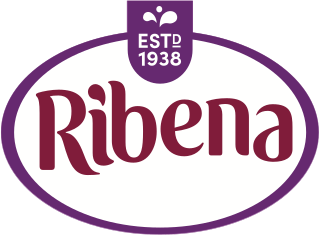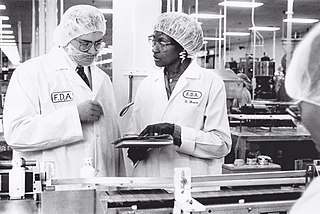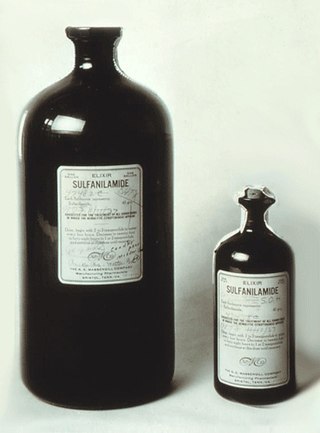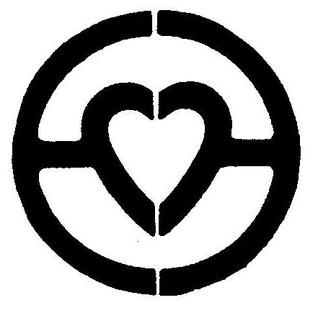Related Research Articles

Ribena is a brand of blackcurrant-based soft drink, and fruit drink concentrate designed to be mixed with water. It is available in bottles, cans and multi-packs. Originally of English origin, it was produced by the pharmaceutical company GlaxoSmithKline (GSK) until 2013, when the brand was sold to Japanese beverage conglomerate Suntory.

GSK plc is a British multinational pharmaceutical and biotechnology company with global headquarters in London. Established in 2000 by a merger of Glaxo Wellcome and SmithKline Beecham, GSK is the tenth largest pharmaceutical company and #294 on the 2022 Fortune Global 500, ranked behind other pharmaceutical companies China Resources, Sinopharm, Johnson & Johnson, Pfizer, Roche, AbbVie, Novartis, Bayer, and Merck Sharp & Dohme.

Sulfonamide is a functional group that is the basis of several groups of drugs, which are called sulphonamides, sulfa drugs or sulpha drugs. The original antibacterial sulfonamides are synthetic (nonantibiotic) antimicrobial agents that contain the sulfonamide group. Some sulfonamides are also devoid of antibacterial activity, e.g., the anticonvulsant sultiame. The sulfonylureas and thiazide diuretics are newer drug groups based upon the antibacterial sulfonamides.

The pharmaceutical industry discovers, develops, produces, and markets pharmaceutical drugs for the use as medications to be administered to patients, with the aim to cure and prevent diseases, or alleviate symptoms. Pharmaceutical companies may deal in generic or brand medications and medical devices. They are subject to a variety of laws and regulations that govern the patenting, testing, safety, efficacy using drug testing and marketing of drugs. The global pharmaceuticals market produced treatments worth $1,228.45 billion in 2020 and showed a compound annual growth rate (CAGR) of 1.8%.

Diethylene glycol (DEG) is an organic compound with the formula (HOCH2CH2)2O. It is a colorless, practically odorless, and hygroscopic liquid with a sweetish taste. It is a four carbon dimer of ethylene glycol. It is miscible in water, alcohol, ether, acetone, and ethylene glycol. DEG is a widely used solvent. It can be a contaminant in consumer products; this has resulted in numerous epidemics of poisoning since the early 20th century.

Dyclonine (Dyclocaine) is an oral anaesthetic that is the active ingredient of Sucrets, an over-the-counter throat lozenge. It is also found in some varieties of the Cepacol sore throat spray. It is a local anesthetic, used topically as the hydrochloride salt.

Sulfanilamide is a sulfonamide antibacterial drug. Chemically, it is an organic compound consisting of an aniline derivatized with a sulfonamide group. Powdered sulfanilamide was used by the Allies in World War II to reduce infection rates and contributed to a dramatic reduction in mortality rates compared to previous wars. Sulfanilamide is rarely if ever used systemically due to toxicity and because more effective sulfonamides are available for this purpose. Modern antibiotics have supplanted sulfanilamide on the battlefield; however, sulfanilamide remains in use today in the form of topical preparations, primarily for treatment of vaginal yeast infections mainly vulvovaginitis which is caused by Candida albicans.

Sensodyne is a brand name of toothpaste and mouthwash targeted at people with sensitive teeth. Sensodyne is owned by Haleon and is marketed under the name Shumitect in Japan.

Elixir sulfanilamide was an improperly prepared sulfonamide antibiotic that caused mass poisoning in the United States in 1937. It is believed to have killed more than 100 people. The public outcry caused by this incident and other similar disasters led to the passing of the 1938 Federal Food, Drug, and Cosmetic Act, which significantly increased the Food and Drug Administration's powers to regulate drugs.

The Beecham Group plc was a British pharmaceutical company. It was once a constituent of the FTSE 100 Index. Beecham, after having merged with American pharmaceutical company SmithKline Beckman to become SmithKline Beecham, merged with Glaxo Wellcome to become GlaxoSmithKline (GSK). GSK still uses the Beechams brand name in the UK for its over-the-counter cold and flu relief products.
Since the 1990s, several mass poisonings from toxic cough syrup have occurred in developing countries. In these cases, an ingredient in cough syrup, glycerine (glycerol), was replaced with diethylene glycol, a cheaper alternative to glycerine for industrial applications. Diethylene glycol is nephrotoxic and can result in multiple organ dysfunction syndrome (MODS), especially in children.
GlaxoSmithKline Pakistan is a Pakistani pharmaceutical company which is a subsidiary of British company GSK. It is the largest pharmaceutical company in Pakistan.
The pharmaceutical industry in the United Kingdom directly employs around 73,000 people and in 2007 contributed £8.4 billion to the UK's GDP and invested a total of £3.9 billion in research and development. In 2007 exports of pharmaceutical products from the UK totalled £14.6 billion, creating a trade surplus in pharmaceutical products of £4.3 billion.
Pharmaceutical fraud involves activities that result in false claims to insurers or programs such as Medicare in the United States or equivalent state programs for financial gain to a pharmaceutical company. There are several different schemes used to defraud the health care system which are particular to the pharmaceutical industry. These include: Good Manufacturing Practice (GMP) Violations, Off Label Marketing, Best Price Fraud, CME Fraud, Medicaid Price Reporting, and Manufactured Compound Drugs. Examples of fraud cases include the GlaxoSmithKline $3 billion settlement, Pfizer $2.3 billion settlement, and Merck $650 million settlement. Damages from fraud can be recovered by use of the False Claims Act, most commonly under the qui tam provisions which rewards an individual for being a "whistleblower", or relator (law).
The Food and Drug Administration is a federal agency of the United States, formed in 1930.
Eleanor Albert Bliss was an immunologist who made significant advancements to the field of immunological research. She was also a dean and professor of biology at Bryn Mawr College.

Study 329 was a clinical trial which was conducted in North America from 1994 to 1998 to study the efficacy of paroxetine, an SSRI anti-depressant, in treating 12- to 18-year-olds diagnosed with major depressive disorder. Led by Martin Keller, then professor of psychiatry at Brown University, and funded by the British pharmaceutical company SmithKline Beecham—known since 2000 as GlaxoSmithKline (GSK)—the study compared paroxetine with imipramine, a tricyclic antidepressant, and placebo. SmithKline Beecham had released paroxetine in 1991, marketing it as Paxil in North America and Seroxat in the UK. The drug attracted sales of $11.7 billion in the United States alone from 1997 to 2006, including $2.12 billion in 2002, the year before it lost its patent.

Food safety in the United States relates to the processing, packaging, and storage of food in a way that prevents food-borne illness within the United States. The beginning of regulation on food safety in the United States started in the early 1900s, when several outbreaks sparked the need for litigation managing food in the food industry. Over the next few decades, the United States created several government agencies in an effort to better understand contaminants in food and to regulate these impurities. Many laws regarding food safety in the United States have been created and amended since the beginning of the 1900s.
References
- 1 2 "Medicine: Post-Mortem". Time magazine . December 20, 1937. Archived from the original on April 3, 2009. Retrieved 2009-07-19.
Then, two months ago, fatality knocked at its door. A new mixture of a new drug (sulfanilamide) with a new solvent (diethylene glycol), which Dr. Massengill's salesmen sold as Elixir Sulfanilamide-Massengill, was discovered to be killing its users
- ↑ Wax, P.M. Elixirs, Diluents, and the Passage of the 1938 Federal Food, Drug and Cosmetic Act. Ann. Intern. Med. March 15, 1995 122(6):456–461.
- ↑ Mark S. Lesney, The ghosts of pharma past, Modern Drug Discovery, January 2004
- ↑ "GlaxoSmithKline provides update on divestment of non-core over-the-counter (OTC) brands". December 20, 2011. Retrieved February 8, 2012.